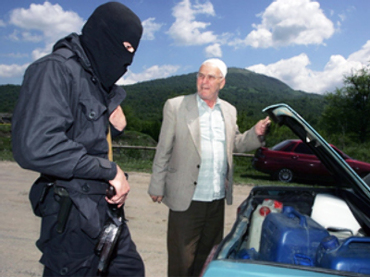
Do the Russian Intelligence Services Not Know Who They Are Fighting in Ingushetia?
Publication: Eurasia Daily Monitor Volume: 9 Issue: 53
By:

Russia’s state-run RIA Novosti news agency reported on March 3 that “the head of the Ingush bandit underground, Adam Tsyzdoev, was liquidated in a special operation” (https://lenta.ru/news/2012/03/03/kill/). Akhmetgeri Tsechoev was killed in the same special operation, which was carried out jointly by Ingushetia’s branches of the Federal Security Service (FSB) and Interior Ministry. Tsechoev was one of the founders of the Ingush human rights organization Mashr (https://ria.ru/defense_safety/20120305/585306977.html).
The operation took place in the city of Malgobek, which is located in the northern part of the republic bordering Chechnya and Ossetia. The official description of the event was classic – that FSB personnel tried to stop the car to check the documents of those inside, who then started shooting at the security personnel, after which an IED in their car detonated. The bodies of the 33-year-old Tsyzdoev and 56-year-old Tsechoev, the latter a resident of the village of Psedakh in Ingushetia’s Malgobek district, were recovered from the car. Tsyzdoev had been on the wanted list for possible involvement in attacks on the police (https://ingushetiyaru.org/news/22775.html).
Nothing new was in the news reports about the incident, which was typical of such reports that the law-enforcement authorities frequently distribute in Chechnya, Ingushetia, Dagestan and Kabardino-Balkaria. Thus the security services do not make strenuous efforts to justify arbitrary killings in the North Caucasus, most of which take place in population centers.
According to the Russian security services, Adam Tsyzdoev was the leader of Ingushetia’s militants. It is strange that the Ingush militants still do not know about it. For some reason, on March 5, two days after Tsyzdoev was reportedly killed, the Ingush militants’ command announced that its Sharia judge (aka kadi) and two militants had been killed in Ekazhevo on January 27 (https://abror.info/2012/03/zayavlenie-komandovaniya-mudzhaxidov-vilayata-gialgiajche/). But it has not yet released a statement about the reported death of Emir Adam.
It is indeed strange that the Ingush rebel command did not know about the death of its emir and did not mention it in their March 4 announcement. In contrast to Chechnya and Dagestan, the Ingush jamaat has no middle level command, so the leaders are directly connected to local insurgent groups. This makes it possible for the Ingush jamaat leaders to be well-informed about ongoing activities of its units. Ingushetia’s area is about 1,500 square miles, about one-third of which is mountainous territory where militants do not go. Since the peculiar arrest of Ingush rebel leader Emir Magas in June 2010, Moscow does not appear to have figured out who his successor, Emir Adam, is. It is otherwise hard to explain why the Russian authorities have declared three consecutive times the capture or killing of Emir Adam. The first time it was Isa Khashegulgov, who was arrested on September 25, 2010. Jamaleil Mutaliev, who was killed on January 27, 2012, was the second. Adam Tsezdoev then became the third “Emir Adam” when his death was reported on March 3.
Until Emir Adam’s death is confirmed by the Ingush rebel command, all of the FSB’s claims about it have little to do with the leader of the Ingush jamaat. These announcements in fact may attest to the Russian security service’s weakness in Ingushetia and the arrested Emir Magas’ refusal to cooperate with his captors in Moscow. While from time to time the Russian media provides information about Magas’ active cooperation with the investigation (https://abror.info/2012/03/zayavlenie-komandovaniya-mudzhaxidov-vilayata-gialgiajche/), it is not very likely given that, under any circumstance, Magas will receive a life sentence, meaning he has no incentives to cooperate.
Akhmetgeri Tsechoev, who was killed in the same incident with Adam Tsyzdoev, was deliberately linked to the rebel suspect by the security services in order to avoid having to justify his killing to his relatives. However, Tsechoev’s relatives regard his death as an extralegal killing. They say Akhmetgeri left active military service in the Russian army in 1992 and joined the reserve. He came to Ingushetia, worked as military commissioner in the republic’s Jeirakh district and also worked in the Malgobek military commissariat. Of the four Tsechoev brothers, three served in the military professionally. The oldest son of Akhmetgeri also studied at a military institution and now currently serves in the Russian Far East (https://ingushetiyaru.org/news/22775.html). Akhmetgeri retired after he reached the rank of colonel. So this is a family with a professional military tradition, whose members are serving in the Russian army for a third generation.
Most likely, Akhmetgeri Tsechoev, who had previously worked as a taxi driver, was giving Adam Tsyzdoev a ride. The FSB’s attempts to establish a link between Tsechoev, one of the founders of the Mashr human rights organization, and the rebels is seen as an attempt to put pressure on the organization. Magomed Mutsolgov, the head of Mashr, said the authorities are trying to destroy one of the leading human rights organizations in the republic. The well-known human rights organization Amnesty International issued a statement in support of Mashr (https://ingushetia.kavkaz-uzel.ru/articles/202656/). These events took place against the backdrop of the kidnapping and subsequent discovery of one of Mashr’s staff members, Murad Yandiev (https://www.kavkaz-uzel.ru/articles/202173/).
Thus, the killing of Adam Tsyzdoev and Akhmetgeri Tsechoev, on the one hand, and pressure on the human rights organization Mashr, on the other, may be directly related. The goal probably is to force Mutsolgov, the head of the organization, to disband Mashr or even emigrate from Russia. This would allow the authorities to avoid Mashr’s revelations about the regional and federal authorities’ policies in Ingushetia. Of course, Tsyzdoev’s participation in the insurgency also cannot be completely ruled out. Whatever the case, the news coming out of Ingushetia indicates that the security services and the local police do not know who they are fighting, and thus have conferred the title of Emir Adam on three different persons.




